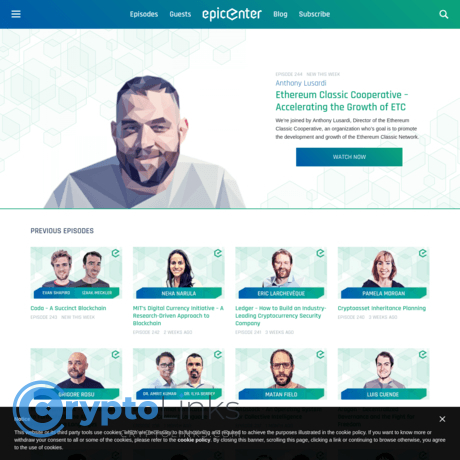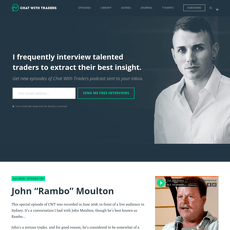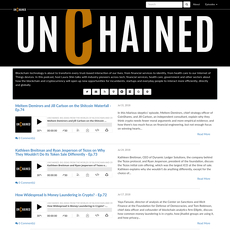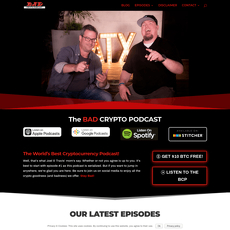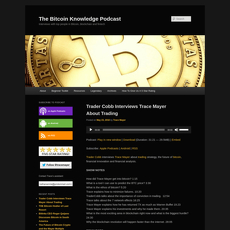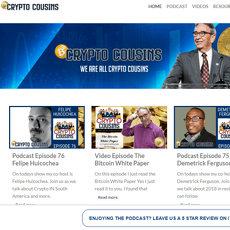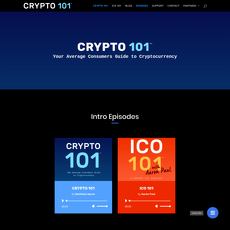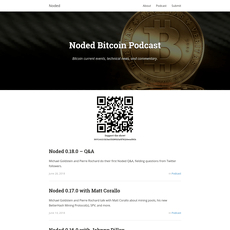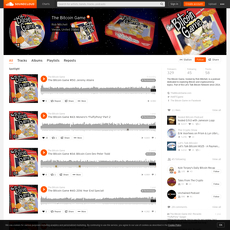Epicenter Review
Epicenter
epicenter.tv
Epicenter (epicenter.tv) review guide: everything you need to know + FAQ
Ever wish you had a crypto podcast that actually teaches you something new each week—without the fluff? If you’re trying to stay sharp in Web3 and want signal from real builders, researchers, and founders, you’re probably wondering which shows deserve your time. Let’s talk about Epicenter—and whether it belongs in your weekly queue.
You’re busy—and most crypto podcasts waste your attention
The space moves at breakneck speed. A lot of shows either oversimplify the hard stuff or go heavy on buzzwords and vibes. The result? You finish an episode and still don’t feel smarter.
- Too shallow: “What is blockchain?” intros wrapped around ad reads.
- Too hyped: token talk without real architecture, security, or trade-offs.
- Too chaotic: irregular publishing, inconsistent quality, guests who can’t answer tough questions.
- Too jargony: acronyms flying everywhere with no scaffolding or context.
And time is the real constraint. According to Edison Research’s Podcast Consumer reports, listeners consistently cite learning and expert insights as top reasons they press play—yet most shows underdeliver on depth. If you’re choosing between 60 minutes of noise and 60 minutes that actually level you up, the choice should be obvious.
Here’s the promise
I’ll keep this simple and practical. In this guide, I’ll:
- Spell out Epicenter’s strengths and blind spots—no sugarcoating.
- Explain who should listen (and who probably shouldn’t).
- Set expectations on format, depth, and cadence so you know exactly what you’re getting.
- Answer key questions upfront: credibility, technical level, publishing schedule, and the types of episodes worth starting with.
If you’ve been burned by shows that talk in circles, you’ll appreciate the clarity.
Why you can trust this take
I run Cryptolinks.com and spend a ridiculous amount of time reviewing crypto podcasts, newsletters, research hubs, and tooling. I track consistency, technical density, and whether a show actually teaches something that stands up a month later.
- Consistency tracking: I audit episode cadence and guest quality over time.
- Substance over hype: I note whether shows explain architecture, economics, and security—not just market chatter.
- Usefulness tests: Would a builder, power user, or serious investor learn something actionable in one listen?
That’s the lens I’m using here—practical value first.
Quick verdict at a glance
If you want thoughtful, technical, founder-level conversations about crypto, blockchains, DeFi, and Web3, Epicenter is one of the most reliable long-running shows you can subscribe to.
- Best for: curious investors, builders, researchers, and power users who like long-form signal.
- Not ideal for: absolute beginners looking for 101 intros or short news hits.
- What to expect: deep interviews that get into protocol design, incentives, scaling trade-offs, and real-world constraints—often the conversations you wish conference panels had time for.
“If your goal is to actually understand how modern crypto systems are built—rollups, staking, MEV, privacy, governance—this show respects your brain.”
Curious who’s behind Epicenter, how long it’s been around, and why industry folks trust it? Let’s get into that next—hosts, history, and what makes its format work week after week.
What is Epicenter and who’s behind it?
Epicenter in a sentence: a long-running crypto podcast and YouTube show that sits builders, founders, and researchers down for real, in-the-weeds conversations about blockchain architecture, crypto economics, DeFi, and Web3—without the fluff.
If you’re tired of surface-level chatter, this is the show where guests actually explain how things work: consensus quirks, validator incentives, rollup design choices, MEV realities, zk-proof engineering, privacy trade-offs, and governance pitfalls. It’s the kind of talk where one good episode can give you a new mental model to spot bad ideas fast.
“Good crypto interviews aren’t about price—they’re about trade-offs.”
The show in one line
Epicenter (epicenter.tv) is a veteran crypto podcast known for deep, technical interviews with the people actually shipping protocols and research—spanning Ethereum, Cosmos, Bitcoin, L2s, MEV, privacy tech, and everything in between.
Hosts, history, and credibility
Back in 2014—when most shows still treated crypto as a novelty—Epicenter launched as “Epicenter Bitcoin” and quickly became a serious hub for engineers and economists to compare notes. Over the years, the roster has included a small group of hosts who live in the trenches of this industry:
- Sébastien Couture — co-founder of the show; early to Web3 company-building and product.
- Brian Fabian Crain — co-founder of Epicenter and co-founder of validator and infrastructure company Chorus One; widely connected across research and staking ecosystems.
- Meher Roy — technical host with a systems mindset; great at pressing for concrete mechanisms and edge cases.
- Friederike Ernst — researcher/operator with hands-on experience in Ethereum and Gnosis leadership; sharp on governance and protocol design.
This mix is why the interviews rarely drift into buzzwords. The hosts know where to push, when to ask “what breaks under adversarial conditions,” and how to translate research paths into “what ships next.”
Want a sense of the range? One week you’ll hear about intent-centric architectures and block building; another, a careful unpacking of rollup decentralization plans or whether FHE and zk primitives are ready for production. It’s builder radio.
Why that matters: industry research (see Edison Research’s ongoing Podcast Consumer studies) shows listeners use long-form, topic-focused podcasts to make higher-stakes decisions and retain complex info better than from short clips. Epicenter leans into that depth by design.
Publishing cadence and episode length
Expect roughly weekly releases, with most episodes running 45–90 minutes. That’s enough time to go past the marketing layer into architecture, incentives, and the “gotchas” that actually decide whether a protocol endures.
- Shorter end (~45–60 min): focused updates with founders on roadmaps or research milestones.
- Longer end (~75–90 min): full-on explorations of system design, security trade-offs, MEV plumbing, or token economics.
I like to think of the show as “one high-signal meeting per week with the right expert in the room.”
Is Epicenter independent?
Yes. Epicenter operates independently and typically funds production through sponsorships and ad reads. The separation is pretty clear: sponsors get a standard slot; the interviews themselves stay editorially driven and skeptical in the right places. You’ll hear hard questions on risks, centralization vectors, and how teams plan to ship—not token cheerleading.
That balance is why the show has aged well through multiple market cycles. When the conversation is about mechanisms and trade-offs, it stays useful whether we’re in bull, bear, or sideways.
Curious where to listen and how to pick a perfect first episode without scrolling for 20 minutes? That’s exactly what I’ll show you next—want the 10-second path to subscribe and a smart way to mine the back catalog?
How to listen, subscribe, and get the most from epicenter.tv
If you’re hunting for a crypto podcast that respects your time, here’s how I set up Epicenter so the best episodes surface automatically, and I actually retain what I hear.
“You don’t need more podcasts; you need the right one at the right time.”
Where to find Epicenter
Epicenter lives almost everywhere you already listen:
- Website: epicenter.tv — clean episode pages with show notes, links, and often transcripts.
- YouTube: Video first? Subscribe on YouTube via the link on their site to watch interviews and use chapters when available.
- Apple Podcasts: Native on iPhone and Mac. Great for notifications and smart playlists.
- Spotify: Solid recommendation engine; easy to share clips.
- RSS: Prefer Overcast, Pocket Casts, AntennaPod, or any open podcast app? Grab the RSS link on the site and paste it in.
Note for Android listeners: Google Podcasts has sunset. If you used it, migrate to YouTube Music, Pocket Casts, or AntennaPod.
Subscribing fast
- Apple Podcasts: Open the app → search “Epicenter” → tap Follow → in settings, toggle Automatic Downloads for new episodes.
- Spotify: Search Epicenter → tap Follow → enable Auto-download and Notifications.
- YouTube: Hit Subscribe on the channel → click the bell → set to All. Add longer interviews to Watch Later.
- RSS + open apps: Copy Epicenter’s RSS link from the site → paste into Overcast/Pocket Casts → set a smart playlist so new episodes with tags like “MEV”, “staking”, or “zk” auto-queue.
- Email: On epicenter.tv, sign up for email updates if you prefer inbox nudges.
Two small toggles that save hours: set playback to 1.25–1.5× (slow to 1× on dense sections) and enable silence trimming if your app supports it.
Navigating topics and the back catalog
The catalog is deep. Use the site’s search and categories to zero in on exactly what you want:
- By theme: Ethereum, Cosmos, scalability, cryptography, DeFi, L2s, MEV, privacy, governance.
- By problem you’re solving:
- Running validators? Search staking, slashing, validator economics.
- Shipping on rollups? Try op-stack, zk-rollups, sequencers.
- Security or research focused? Look for formal verification, zk, FHE, audits.
- Market structure nerd? Filter for MEV, PBS, block building.
- Quick find trick: On any episode page with a transcript, use Cmd/Ctrl + F to jump to the exact section mentioning “PBS” or “restaking,” then scrub the audio to that timestamp.
- Year filters: Want the newest takes? Sort by most recent, then save one older “classic” episode on the same topic to compare how thinking has evolved.
Pro move: build a saved search in your podcast app for keywords like “MEV”, “zk”, or “rollup” so those episodes land in your queue automatically.
Best way to start if you’re new
You don’t need to start at Episode 1. Start where your brain already has hooks:
- Pick one topic you already follow (staking, rollups, Cosmos, privacy). Choose a recent episode with a founder or protocol you recognize. Familiarity reduces cognitive load and keeps you engaged.
- Skim before you listen: read the show notes and scan linked docs. Research shows pre-exposure to key terms boosts comprehension and recall.
- Give yourself a goal: write down two questions you want answered before you press play. You’ll listen more actively.
- Use a simple note template:
- Problem: What is this tech trying to fix?
- How it works: One sentence on the architecture.
- Trade-offs: What it gives up to win.
- Action: One thing to read/test next.
- Timebox it: 25 minutes listening, 3 minutes notes, 1 minute to add a follow-up link. Short, sharp sessions beat marathon listens.
- Then stretch one step: queue a second episode just outside your comfort zone (e.g., if you did staking, next do MEV or zk). That’s how your map of Web3 compounds.
Listening is easy; learning is intentional. Active recall, spaced repetition, and quick notes are well-established ways to retain more from complex topics. Even two bullet points per episode will pay off later when you’re comparing protocols or design choices.
Curious how technical it gets and who will benefit most from that depth? That’s exactly what I’m tackling next.
Content quality: depth, style, and who it’s for
How technical does it get?
Short answer: real technical. The conversations often go past buzzwords into how a system is actually built and operated. Expect questions about architecture, adversarial models, and what breaks under stress — the kind of details you only get when the host has done the homework and the guest is deep in the trenches.
- Protocol architecture: They’ll unpack consensus tweaks (e.g., proposer-builder separation, committee design), rollup choices (fraud vs validity proofs), and data availability trade-offs without dumbing it down.
- Token and economic design: Not just “number go up,” but issuance schedules, validator incentives, MEV supply chains, LST dynamics, and how parameters steer behavior.
- Security and threat modeling: You’ll hear about slashing conditions, relay trust, censorship vectors, cross-domain reorgs, and practical bug classes in smart contracts.
- Roadmaps and research: Concrete milestones, why certain designs were chosen (and rejected), and what would falsify a project’s thesis.
For example, when the topic is rollups, the hosts don’t stop at “cheaper transactions.” They’ll press into proof systems (Groth16 vs PLONK vs STARKs), latency vs throughput, what a sequencer decentralization path looks like, and how fee markets evolve once shared sorting or PBS enters the picture. On staking, the questions turn to operator concentration, correlated slashing risk, restaking externalities, and whether governance can actually mitigate these risks or just paperwork them away.
Learning-wise, this format works. Education research consistently shows that concrete examples + “why” questions improve retention. The show leans exactly on that: examples, failure modes, and trade-offs. If you’re the type who likes to build a mental model rather than memorize headlines, you’ll feel at home.
“In a world obsessed with hype, honest technical clarity feels like a superpower.”
Who benefits most
I find the sweet spot is anyone who wants to make decisions with actual understanding, not vibes. If that’s you, you’ll get value.
- Protocol engineers and smart contract devs: Clear thinking around system boundaries, APIs, and edge cases you’ll actually code against.
- Security researchers/auditors: Threat models stated out loud; handy for mapping attack surfaces and incentives.
- Serious investors: Enough depth to pressure-test theses: decentralization metrics, runway vs roadmap, adoption bottlenecks.
- Founders/PMs: Product-meets-research context that helps with sequencing features and aligning incentives.
- Power users/governance voters: Better signal on proposals, validator sets, MEV policies, and treasury decisions.
- Curious learners with patience: If you like long-form thinking and don’t mind hitting pause to check a term, you’ll level up quickly.
Is it beginner-friendly?
It skews intermediate-to-advanced. You won’t get “What is a blockchain?” primers here. But beginners aren’t locked out — you just need a strategy. Here’s what works for people I’ve recommended it to:
- Start with what you know: If you’ve used Ethereum L2s or staked with a validator, pick episodes touching those topics first. Familiar anchors cut the cognitive load.
- Use transcripts and show notes: Skim the episode page on epicenter.tv for key links and terms. It turns “what did they mean by that?” into a 30-second lookup.
- Pause with purpose: Research suggests short breaks and retrieval (quickly restating what you heard) boost comprehension. Listen in segments; you’ll retain more.
- Build a tiny glossary: Three lines in your notes for recurring terms (PBS, MEV-Boost, DA, zkVM). You’ll feel compound interest within a week.
I won’t pretend it’s easy mode — it’s not. But the trade is fair: a little extra effort for unusually high-quality understanding.
Editorial tone and bias
The tone is curious, calm, and generally fair. When a project is on, the hosts tend to separate excitement from evidence. They’ll ask about:
- Real decentralization (Nakamoto coefficient, validator/operator concentration, client diversity).
- Token mechanics (supply, unlocks, market-maker dependencies, emissions thoughtfulness).
- Roadmap realism (dependencies, risks, and what “done” looks like beyond testnets).
- Externalities (MEV policy, censorship risk, governance capture, privacy trade-offs).
Sponsorships exist, but they’re clearly separated from the interviews. The conversations don’t feel like token pushes; if anything, guests are nudged to articulate risks and failure cases. That’s the test I use for credibility: do they explore what could go wrong, not just what could go right?
So here’s the question that really decides if you’ll love it: do you enjoy hearing builders think through trade-offs out loud? If yes, you’ll stay for hours. And if you’re wondering which episodes deliver the biggest payoff for your time — plus a few drawbacks to watch for — that’s exactly what I’m sharing next.
Highlights, drawbacks, and standout episodes
“In crypto, the edge isn’t in breaking news — it’s in understanding the trade‑offs.”
What Epicenter does best
I keep coming back to a few things that consistently hit the mark:
- Builder-first conversations: The hosts push past buzzwords and ask how things actually work. Think practical questions about mempools, economic security, validator incentives, and on-chain governance — not promo talk.
- Top-tier guests at the right time: When topics like restaking, MEV, or rollup frameworks become pivotal, they bring on the people shipping the code — e.g., Flashbots on MEV-Boost and proposer/builder separation, EigenLayer on restaking, Optimism/Arbitrum on L2 design, and Cosmos researchers on IBC and shared security.
- Real learning per episode: I almost always leave with a mental model I didn’t have before — like how block builders decide bundles, why L2 fraud/validity proofs demand specific UX trade-offs, or how privacy systems balance throughput vs. leakage.
- Show notes that matter: Links to GitHubs, whitepapers, and talks make it easy to go from “heard it” to “I understand it.” That follow-through is rare and valuable.
Examples that stood out for me:
- MEV and block building: Flashbots team members unpacking MEV-Boost, PBS, and the social layer risks.
- Restaking and security markets: EigenLayer’s approach to shared security and what it unlocks (and risks).
- L2 reality checks: Optimism’s OP Stack vs. Arbitrum Nitro trade-offs; how data availability and fault proofs change the UX.
- Privacy tech that’s actually shipping: Aztec’s zk approach, and broader conversations on SNARKs, proof systems, and emerging FHE directions.
- Cosmos and modularity: IBC, Interchain Security, and the economics of appchains with long-time Cosmos contributors.
Possible downsides
- It can feel dense at first: If terms like PBS, reorgs, or state growth aren’t familiar, you’ll hit pause a lot. That’s not a bug — it’s how you level up.
- Long episodes demand focus: Most are 45–90 minutes, so you’ll want a commute, gym session, or walk to give them the attention they deserve.
- Jargon happens: You’ll hear protocol acronyms and research lingo. The show notes help, but expect to Google a few things.
Quick listening tips that actually work:
- Skim the show notes first and note 2–3 questions you want answered. Research on effective learning (e.g., Dunlosky et al., 2013) shows that active goals and retrieval practice boost retention.
- Use 1.2–1.5x speed for familiar topics; slow down for new ones. Then write a two-sentence summary — you’ll remember it next week.
- Bookmark timestamps where your understanding “clicks” and revisit in a day or two for spaced reinforcement.
Good starter episodes
If you want a smart first pass, pick a theme you already follow and choose a recent episode with a name you recognize. A few reliable topic lanes:
- Rollups and L2s: Episodes with teams from Optimism, Arbitrum, StarkWare, or zkSync. You’ll hear about proofs, data availability, fault/validity designs, and decentralizing sequencers.
- Staking and validator economics: Conversations on slashing conditions, re-staking markets, and the realities of running validators at scale (Ethereum, Cosmos). Look for guests from EigenLayer and reputable validator operators.
- MEV, builders, and order flow: Flashbots and research-focused guests breaking down auctions, bundles, and how incentives change post-PBS.
- Privacy tech: Teams like Aztec and other zk-focused projects. Expect honest talk on performance ceilings, UX, and where FHE is headed.
- Governance case studies: Protocols that iterated publicly (e.g., treasury reform, fee switches, “endgame” strategies). These are gold if you care about long-term protocol health.
If you prefer names to search for, I’ve had great learning moments with guests like Phil Daian (MEV/Flashbots), Sreeram Kannan (EigenLayer), Sunny Aggarwal (Cosmos/Osmosis), Eli Ben-Sasson (StarkWare), and Zac Williamson (Aztec). You’ll find several of them across the catalog on epicenter.tv.
How it compares to other shows
- Versus Bankless: Bankless is stronger on newsy cycles, narratives, and investor-facing takes. Epicenter leans into architecture, mechanism design, and research trade-offs — fewer market vibes, more system design.
- Versus Unchained: Unchained serves a broad audience with accessible interviews and news recaps. Epicenter is the pick when you want the technical “why” behind a system and its roadmap.
- Versus hyperspecialized shows (e.g., zero-knowledge only): Those can go deeper on one domain; Epicenter keeps a wider lens across L1s/L2s, MEV, privacy, and governance while still getting into the weeds.
Want the quick answers on credibility, cadence, and where to listen — plus whether it’s right for you today? I’ve got you. Ready for the rapid-fire FAQ next?
FAQ: quick answers to what people also ask
What is Epicenter and is it legit?
Yes. Epicenter is a long-running crypto podcast and YouTube show that’s been publishing since 2014. Longevity matters in crypto media—very few shows keep a steady cadence for a decade while landing founders, researchers, and protocol engineers from major L1/L2s and research orgs. That consistency is a real credibility signal.
Who hosts Epicenter?
A rotating team over the years, including Sébastien Couture, Brian Fabian Crain, Meher Roy, and Friederike Ernst. You’ll notice the hosting lineup can vary, but the editorial style stays consistent: curious, technically literate, and focused on how things actually work.
How often do new episodes come out?
Roughly once a week. You’ll see occasional gaps around holidays or big events, but the default rhythm is weekly, which makes it easy to fold into your listening routine.
Where can I listen?
You can stream or subscribe pretty much anywhere you already listen to podcasts:
- epicenter.tv (episode pages, show notes, and many transcripts)
- YouTube
- Apple Podcasts
- Spotify
- Google Podcasts
- RSS (for any other app)
Is Epicenter good for beginners?
It skews intermediate-to-advanced. New listeners can absolutely learn a ton, but expect real terminology: rollups, MEV, cryptography primitives, consensus, token design. A simple trick that helps: keep a notepad, pause to search terms, and glance at the show notes first. Research on multimedia learning (e.g., Mayer’s principles) suggests pairing audio with text improves recall—so using transcripts boosts comprehension.
How does Epicenter make money?
Mainly through sponsorships/ads. The sponsor reads are clearly separated from the interviews, and the questions remain editorially driven. That separation is why the conversations rarely feel like token pitches.
Can I suggest a guest or topic?
Yes. Head to epicenter.tv and use their contact or social links to pitch a founder, researcher, or a topic you want explored (MEV changes, novel zk applications, restaking, privacy tech, governance experiments, you name it). Be concise and specific—why this guest, why now, and what questions matter.
Are there transcripts and show notes?
For many episodes, yes. The show notes often link to docs, whitepapers, GitHub, and talks. When transcripts are available, they’re a cheat code for learning: skim first, listen at 1.2–1.5x, then jump to timestamps for the sections you want to study.
Does Epicenter cover NFTs, DeFi, and L2s?
Yes—with a technical tilt. Expect architecture and trade-offs: L1/L2 scaling (rollups, data availability, interoperability), DeFi mechanisms (AMMs, lending risk, oracle design), MEV and block building, privacy tech (zk, FHE), validator economics, and governance case studies. It’s less about price action, more about how systems are built and upgraded.
Bonus resources to keep learning
Save this for your research stack:
Pro tip: Pair an episode with the project’s docs and a short summary you write yourself. That small loop (listen → read → summarize) dramatically improves retention and turns passive listening into real understanding.
Want to know whether I’d put Epicenter at the top of your weekly queue—and the simple system I use to get maximum value out of one episode? That’s exactly what I’m sharing next.
My take, rating, and next steps
How I rate Epicenter for Cryptolinks readers
I measure shows on depth, credibility, and how often they actually teach me something new. On those fronts, Epicenter keeps delivering.
- Depth: 9.5/10 — Real architecture, trade-offs, and research thinking, not surface-level chatter.
- Credibility: 9/10 — Long-running hosts, strong guests, transparent sponsor separation.
- Consistency: 9/10 — Regular cadence, few misses, steady quality across years.
- Usefulness: 9/10 — When I finish an episode, I walk away with a better mental model.
Overall: 9.2/10. If you value understanding the “why” behind protocols and the “how” behind roadmaps, this is time well spent.
What to do next
- Follow now: Open your podcast app, search Epicenter, hit follow, or go straight to epicenter.tv.
- Pick two episodes: one on a topic you already track (say, staking or rollups) and one that stretches you (MEV, zk-proofs, FHE, governance mechanisms).
- Skim first: Read the show notes and scan the outline. Setting intent before listening helps you learn faster (see advance organizers in learning research).
- Listen with a purpose: Write down one question you want answered before you hit play. Afterward, answer it from memory. That “test yourself” step boosts retention (testing effect, also summarized in Dunlosky et al., 2013).
- Mark timestamps: Use your app bookmarks or jot timecodes for key insights and definitions. Revisit them a week later—spaced review beats passive replays (Dunlosky et al., 2013).
How to squeeze value in 20 minutes (on a busy day)
- Minute 0–2: Skim show notes for the guest’s thesis and the episode’s outline.
- Minute 2–12: Play at 1.25x–1.5x until you reach the first “trade-off” or “design choice” discussion. That’s where the learning lives.
- Minute 12–20: Pause, write a three-sentence summary in your own words, and note one follow-up to research (e.g., a whitepaper, GitHub repo, or competing approach).
Sample from my workflow: in an episode on validator economics, I bookmarked the section on “inclusion lists vs. censorship resistance.” Later I compared it with notes from another protocol’s approach. Ten minutes of cross-checking turned a passing idea into a durable mental model.
Make episodes “stick” with a light system
- Create a tiny glossary: When a new term appears (PBS, KZG, CRDTs), capture a one-line definition. You’ll onboard faster to future episodes.
- Track evolving theses: Keep a note titled “Scaling: my current view.” Update it after relevant episodes. You’ll see your thinking compound.
- Set a monthly review: Revisit two timestamps you saved and one episode you skipped. Quick reviews compound insights without extra hours.
If I finish an episode without at least one new mental model, it probably wasn’t Epicenter.
Final word
Epicenter is for listeners who want substance and aren’t afraid of real technical conversation. If that’s you, it’s worth your time.
Subscribe, queue one familiar topic and one stretch topic, and use the simple timestamp-and-review habit above. I’ll keep flagging standout listens so you never miss the strongest episodes—watch the feed here: cryptolinks.com/news.
When a show consistently upgrades your thinking, keep it in your rotation. This one does.

